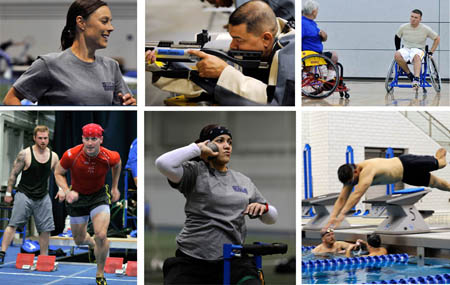
 May 20, 2013—The Air Force came away from the 2013 Warrior Games with a total of 30 medals: three gold, 11 silver, and 16 bronze. This total nearly doubled the service’s medal count from last year.
May 20, 2013—The Air Force came away from the 2013 Warrior Games with a total of 30 medals: three gold, 11 silver, and 16 bronze. This total nearly doubled the service’s medal count from last year.
Three-time triathlete and first-time Warrior Games competitor Air Force Capt. Mitchell Kieffer won the title of the Ultimate Champion for his performance in five competitions: the 50-meter freestyle swim, 10-meter prone air rifle shooting, a 100-meter sprint, cycling, and shot put. He won the silver medal in the rifle shooting.
This was the first time an airman won the Ultimate Champion title.
Kieffer suffers from traumatic brain injury and compression fractures in his back from injuries sustained in Afghanistan in 2010.
“It’s almost euphoric just to be connected to so many great people, and I feel everyone is better than myself,” he said. “It’s a very exciting honor just to be here.” He said he plans to be back for next year’s games.
Athletes competed in seven different sports during the all-services paralympics games, which took place at the Air Force Academy and the Olympic Training Center in Colorado Springs, Colo. They were: archery, cycling, shooting, sitting volleyball, swimming, track and field, and wheelchair basketball.
The six-day event wrapped up on May 16. It drew 260 US service members and veterans, including 50 from the Air Force. The count also includes members from the special operations community and British armed forces. It was the fourth year of the games.
Eligible to compete in the Warrior Games are service personnel with combat-related injuries, non-combat-related injuries, and those with so-called “invisible” wounds.
SSgt. Lara Ishikawa, one of the Air Force’s gold medalists, is a cancer survivor. She won the women’s 100-meter open relay in just 14.24 seconds on May 14. “I’ve been pushed to my max,” she said, getting ready for the games, “and emotionally, I’ve met some incredible people.”
One of the reasons why the Warrior Games is so popular is because athletes view it as a form of therapy. TSgt. Axel Gaud-Torres signed up for the games because he and his wife knew it would be good for him. Gaud-Torres suffers from post-traumatic stress disorder and residual pains from injuries sustained from an explosion in Iraq eight years ago. He competed in archery, rifle shooting, and sitting volleyball.
Every time he steps onto the shooting field, “it’s like I’m back before everything happened, before I even deployed. It’s so peaceful when I’m out there on the line. You don’t anticipate the shot. You just let it happen. It’s just me and the target and perfect peace and harmony,” he said.
On her second deployment to Iraq, now retired SSgt. Zuleika Cruz-Pereira was diagnosed with mild traumatic brain injury and sustained cervical, back, and sciatica nerve injuries after an accident involving a heavy piece of equipment. She also had undiagnosed post-traumatic stress disorder from her previous tour and found herself falling into depression.
“When they told me about the games, it opened a lot of doors and it opened my mind to it,” said Cruz-Pereira. “I wanted to be involved in sports again because that’s me. I wanted to feel like I can be normal again, even if I’m in pain.” She finished fifth in women’s handcycle and recumbent cycling.
The Warrior Games are “designed to introduce injured service members and veterans to paralympic sport competition and encourage them to stay physically active when they return to their local communities,” states the US Paralympics website.
SMSgt. Martin Smith, an Air Force Reservist, lost his leg eight months ago in a motorcycle accident. Training for the games helped lift his mood and bring out his competitive spirit.
“My [ultimate] goal is to try to get back to the point where I can have a unit run and call cadence,” he said. Smith signed up as a swimmer although he had not swum competitively in more than 30 years; he took home the silver medal in the men’s 50-meter backstroke in just 45.59 seconds.
For retired SSgt. Larry Franklin, the Warrior Games “saved [his] life.” Franklin was shot in the back of his head on his third deployment to the Southwest Asia in 2007. He now suffers from traumatic brain injury and post-traumatic stress disorder, leaving him with massive headaches and difficulty coordinating. During the games, Franklin competed in swimming and wheelchair basketball.
“It took me two years to stop being a tough guy and let people help me, and I encourage everyone else to do the same,” he said.
The Defense Department partners with the US Olympics Committee Paralympics Military Program each year to host the Warrior Games.
This year’s sponsors were Deloitte, DOD, Veterans Affairs Department, United Service Organizations, Fisher House Foundation, AT&T, BP, Budweiser, and the Semper Fi Fund.
(See also Warrior Games blog page and Kicking Off the Warrior Games)

